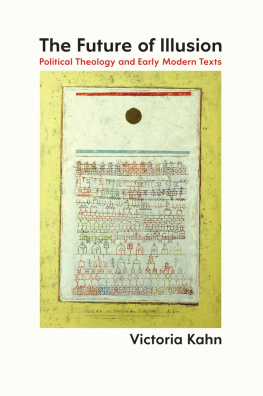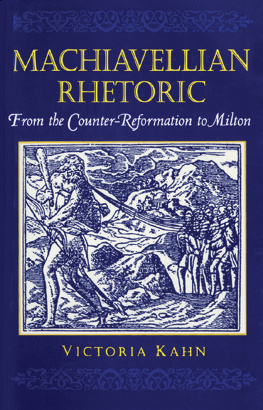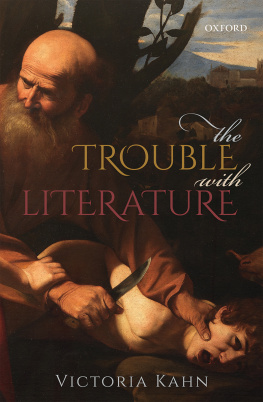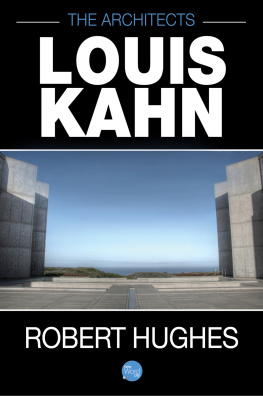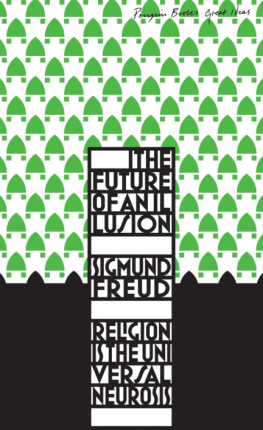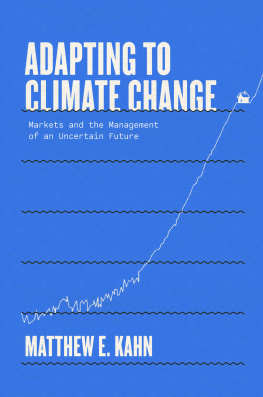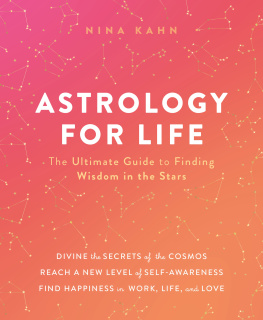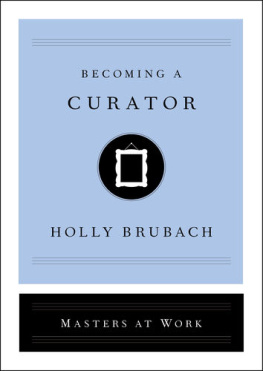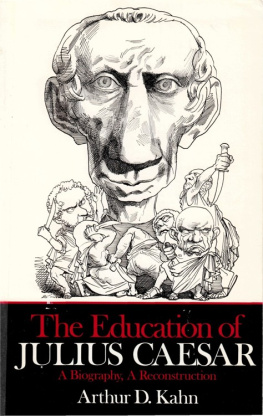Victoria Kahn - The Future of Illusion
Here you can read online Victoria Kahn - The Future of Illusion full text of the book (entire story) in english for free. Download pdf and epub, get meaning, cover and reviews about this ebook. year: 2014, publisher: University of Chicago Press, genre: Politics. Description of the work, (preface) as well as reviews are available. Best literature library LitArk.com created for fans of good reading and offers a wide selection of genres:
Romance novel
Science fiction
Adventure
Detective
Science
History
Home and family
Prose
Art
Politics
Computer
Non-fiction
Religion
Business
Children
Humor
Choose a favorite category and find really read worthwhile books. Enjoy immersion in the world of imagination, feel the emotions of the characters or learn something new for yourself, make an fascinating discovery.
- Book:The Future of Illusion
- Author:
- Publisher:University of Chicago Press
- Genre:
- Year:2014
- Rating:3 / 5
- Favourites:Add to favourites
- Your mark:
- 60
- 1
- 2
- 3
- 4
- 5
The Future of Illusion: summary, description and annotation
We offer to read an annotation, description, summary or preface (depends on what the author of the book "The Future of Illusion" wrote himself). If you haven't found the necessary information about the book — write in the comments, we will try to find it.
The Future of Illusion — read online for free the complete book (whole text) full work
Below is the text of the book, divided by pages. System saving the place of the last page read, allows you to conveniently read the book "The Future of Illusion" online for free, without having to search again every time where you left off. Put a bookmark, and you can go to the page where you finished reading at any time.
Font size:
Interval:
Bookmark:
Victoria Kahn is the Katharine Bixby Hotchkis Professor of English and professor of comparative literature at the University of California, Berkeley. She is the author of Rhetoric, Prudence, and Skepticism in the Renaissance; Machiavellian Rhetoric: From the Counter-Reformation to Milton; and Wayward Contracts: The Crisis of Political Obligation in England, 16401674.
The University of Chicago Press, Chicago 60637
The University of Chicago Press, Ltd., London
2014 by The University of Chicago
All rights reserved. Published 2014.
Printed in the United States of America
23 22 21 20 19 18 17 16 15 14 1 2 3 4 5
ISBN-13: 978-0-226-08387-2 (cloth)
ISBN-13: 978-0-226-08390-2 (e-book)
DOI: 10.7208/chicago/9780226083902.001.0001
Library of Congress Cataloging-in-Publication Data
Kahn, Victoria Ann, author.
The future of illusion : political theology and early modern texts / Victoria Kahn.
pages cm
Includes bibliographical references and index.
ISBN 978-0-226-08387-2 (cloth : alkaline paper)
ISBN 978-0-226-08390-2 (e-book) 1. Political theology. 2. Politics in literature. 3. Theology in literature. 4. European literatureHistory and criticism. I. Title.
BT83.59.K34 2013
201.72dc23
2013017961
 This paper meets the requirements of ANSI/NISO Z39.48-1992 (Permanence of Paper).
This paper meets the requirements of ANSI/NISO Z39.48-1992 (Permanence of Paper).
The Future of Illusion:
Political Theology and Early Modern Texts
Victoria Kahn
The University of Chicago Press
Chicago and London
Den Himmel berlassen wir
Den Engeln und den Spatzen.
HEINRICH HEINE
To live in a political realm with neither authority nor the concomitant awareness that the source of authority transcends power and those who are in power, means to be confronted anew, without the religious trust in a sacred beginning and without the protection of traditional and therefore self-evident standards of behavior, by the elementary problems of human living-together.
HANNAH ARENDT
Abbreviations
AS
Sigmund Freud, An Autobiographical Study, trans. James Strachey (New York: Norton, 1989)
BPP
Sigmund Freud, Beyond the Pleasure Principle, trans. James Strachey (New York: Bantam Books, 1967)
CD
Sigmund Freud, Civilization and Its Discontents, trans. James Strachey (New York: Norton, 1989)
CP
Carl Schmitt, The Concept of the Political, trans. George Schwab (Chicago: University of Chicago Press, 1996)
D
Machiavelli, Discourses on the First Decade of Titus Livius, in Machiavelli: The Chief Works and Others, trans. Allan Gilbert, 3 vols. (Durham: Duke University Press, 1989), cited by book, chapter, and page number
FI
Sigmund Freud, The Future of an Illusion, trans. James Strachey (New York: Norton, 1989)
HH
Carl Schmitt, Hamlet or Hecuba, trans. David Pan and Jennifer Rust (New York: Telos Press, 2009)
MM
Sigmund Freud, Moses and Monotheism, The Standard Edition of the Complete Psychological Works of Sigmund Freud, ed. and trans. James Strachey, vol. 23 (London: Vintage, 2001)
NCP
Leo Strauss, Notes on Carl Schmitt, The Concept of the Political, in CP
P
Machiavelli, The Prince, trans. Robert M. Adams (New York: Norton, 1977), cited by chapter and page number
PT
Carl Schmitt, Political Theology, trans. George Schwab (Cambridge: MIT Press, 1988)
RC
Carl Schmitt, Roman Catholicism and Political Form (1923), trans. G. L. Ulmen (Westport, CT: Greenwood Press, 1996). This translation is based on the second, revised 1925 edition.
SCR
Leo Strauss, Spinozas Critique of Religion, trans. E. M. Sinclair (Chicago: University of Chicago Press, 1965)
T
Walter Benjamin, The Origin of German Tragic Drama, trans. John Osborne (London: NLB, 1977)
TKTB
Ernst H. Kantorowicz, The Kings Two Bodies: A Study in Medieval Political Theology (Princeton: Princeton University Press, 1957)
TM
Leo Strauss, Thoughts on Machiavelli (Chicago: University of Chicago Press, 1958)
TT
Sigmund Freud, Totem and Taboo, trans. A. A. Brill (New York: Vintage Books, 1946)
TTP
Benedict de Spinoza, Theological-Political Treatise, ed. Jonathan Israel, trans. Michael Silverthorne and Jonathan Israel (Cambridge: Cambridge University Press, 2007), cited by chapter and page number
Preface
This is a book about the relationship between political theology, art, and rational critique, both in the early modern period and in our own. It is also a book about the process of reading several times over. In my work on early modern texts, I have repeatedly encountered critical books that did not exactly seem to be part of the secondary literaturewhether because the argument was unorthodox or because the function of commentary was so clearly subordinated to a different kind of argument, an argument about modernity. But precisely for this reason, these works have seemed more alive, more current, more relevant today than many of the classic works of scholarship on the Renaissance and early modern period. Some of these works are now enthroned in the canon of theoryWalter Benjamins Trauerspiel book, Carl Schmitts Political Theologybut the specificity of their engagement with early modern texts has mostly been ignored. Some take the form of commentary on difficult early modern textsthis is the case with Leo Strausss books on Machiavelli and Spinozabut they have been neglected by early modernists precisely because they have seemed too tendentious about the conditions of modernity. And yet, in reading the early moderns to make sense of modernity, they serve to remind us why we read at all. Its the wager of this book that the contemporary conversation about political theology has much to gain by returning to these seminal twentieth-century works and taking seriously their engagement with early modern texts.
In this book, I read the modern readings of the early modern period in order to discover the historical roots of the assumption that, as Hobbes and Vico argued, we can know only what we make ourselves. Borrowing from some of the modern figures in this book, I use the term poiesis to capture this concern with making as a new form of knowing. Its an argument of this book that the early modern concern with poiesis, with art broadly conceived, had an important role to play in negotiating the relationship between politics and theology, and that art is precisely what has been missing from the current debate. In focusing on art in the broad sense in which the early modern period understood it, the book challenges the view that enlightenment is predicated on purging reason of its illusions. The more radical enlightenment of the early modern period is instead the enlightenment that comes with accepting the impossibility of any such bedrock or foundation. Illusion, as Freud noted, is not simply a matter of error; it is constitutive of who we are. But Freud also insisted that some illusions are better than others. So, I will argue, do the early moderns in ways that are still exemplary for us today.
I would like to highlight at the outset the methodological decision to write this book in terms of a series of conversations: not only between the modern figures and the early moderns who fascinated them, but among the moderns themselves. If, from one perspective, the book describes the activities of two campsone sympathetic to and the other critical of the early modern turn toward poiesisfrom another perspective, the book shows all of the moderns struggling to make sense of the implications of this radical turn toward poiesis and away from transcendental justifications of human agency. In this struggle, Schmitt is deeply engaged with Strauss, Strauss with Ernst Cassirer, Ernst Kantorowicz with Cassirer and Schmitt, Benjamin with Schmitt, and Hannah Arendt with Benjamin. Freud is the exception in the sense that his primary interlocutor is not one of his contemporaries but rather Spinoza. These conversations are the focus of the chapters that follow, chapters that are designed to provide a fuller context for our conversations about political theology today.
Next pageFont size:
Interval:
Bookmark:
Similar books «The Future of Illusion»
Look at similar books to The Future of Illusion. We have selected literature similar in name and meaning in the hope of providing readers with more options to find new, interesting, not yet read works.
Discussion, reviews of the book The Future of Illusion and just readers' own opinions. Leave your comments, write what you think about the work, its meaning or the main characters. Specify what exactly you liked and what you didn't like, and why you think so.

